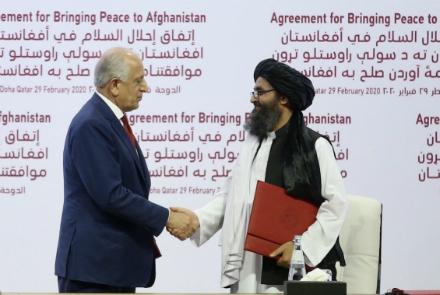Following 18 months of negotiations in Doha, the United States and the Taliban on Saturday officially signed a peace deal that will pave the way for the withdrawal of U.S. forces from Afghanistan in exchange for a number of solid assurances by the Taliban to the U.S. and its allies
The agreement states that the U.S. will fully withdraw its forces over the next 14 months and that the current force of about 13,000 troops will be reduced to 8,600 within 135 days. Non-U.S. NATO and other coalition forces will also be reduced proportionally over that time.
Titled the “Agreement for Bringing Peace to Afghanistan,” the “comprehensive peace agreement” has four key parts:
- Guarantees and enforcement mechanisms that will prevent the use of the soil of Afghanistan by any group or individual against the security of the United States and its allies
- Guarantees, enforcement mechanisms and announcement of a timeline for the withdrawal of all foreign forces from Afghanistan
- After the announcement of guarantees for a complete withdrawal of foreign forces and timeline in the presence of international witnesses and guarantees and the announcement in the presence of international witnesses that Afghan soil will not be used against the security of the United States and its allies, the Taliban will start intra-Afghan negotiations with Afghan sides on March 10, 2020
- A permanent and comprehensive ceasefire will be an item on the agenda of the intra-Afghan dialogue and negotiations. The participants of intra-Afghan negotiations will discuss the date and modalities of a permanent and comprehensive ceasefire, including joint implementation mechanisms, which will be announced along with the completion and agreement over the future political roadmap of Afghanistan.
According to the agreement, the United States has committed to withdraw from Afghanistan all military forces of the United States, its allies and coalition partners, including all non-diplomatic civilian personnel, private security contractors, trainers, advisors, and supporting services personnel within 14 months following the announcement of the agreement and will take the following measures in this regard:
The agreement states that the United States is committed to start immediately working with all relevant sides on a plan to expeditiously release combat and political prisoners as a confidence-building measure.
On the prisoners release, the agreement says: “Up to five thousand (5,000) prisoners of the Islamic Emirate of Afghanistan, which is not recognized by the United States as a state and is known as the Taliban, and up to one thousand (1,000) prisoners of the other side will be released by March 10, 2020, the first day of intra-Afghan negotiations, which corresponds to Rajab 15, 1441 on the Hijri Lunar calendar and Hoot 20, 1398 on the Hijri Solar calendar. “
At the start of intra-Afghan talks, the agreement reads: “With the start of intra-Afghan negotiations, the United States will initiate an administrative review of current U.S. sanctions and the rewards list against members of the Islamic Emirate of Afghanistan which is not recognized by the United States as a state and is known as the Taliban with the goal of removing these sanctions by August 27, 2020, which corresponds to Muharram 8, 1442 on the Hijri Lunar calendar and Saunbola 6, 1399 on the Hijri Solar calendar.”
The agreement also said that the United States and its allies will refrain from the threat or the use of force against the territorial integrity or political independence of Afghanistan or intervening in its domestic affairs.
Based on the agreement, the Taliban has also committed to the following measures:
- The Taliban will not allow any of its members, other individuals or groups, including al-Qa’ida, to use the soil of Afghanistan to threaten the security of the United States and its allies.
- The Taliban will send a clear message that those who pose a threat to the security of the United States and its allies have no place in Afghanistan, and will instruct Taliban members not to cooperate with groups or individuals threatening the security of the United States and its allies.
- The Taliban will prevent any group or individual in Afghanistan from threatening the security of the United States and its allies and will prevent them from recruiting, training, and fundraising and will not host them in accordance with the commitments in this agreement.
- The Taliban is committed to dealing with those seeking asylum or residence in Afghanistan according to international migration law and the commitments of this agreement, so that such persons do not pose a threat to the security of the United States and its allies.
- The Taliban will not provide visas, passports, travel permits, or other legal documents to those who pose a threat to the security of the United States and its allies to enter Afghanistan.
The United States will request the recognition and endorsement of the United Nations Security Council for this agreement.
The agreement suggests that the U.S. and the Taliban seek positive relations with each other and expect that the relations between the United States and the new post-settlement Afghan Islamic government as determined by the intra-Afghan dialogue and negotiations will be positive.
On U.S.-Afghanistan future economic cooperation, the agreement reads: “The United States will seek economic cooperation for reconstruction with the new post-settlement Afghan Islamic government as determined by the intra-Afghan dialogue and negotiations, and will not intervene in its internal affairs.”
(By arrangement with Tolo News)
















